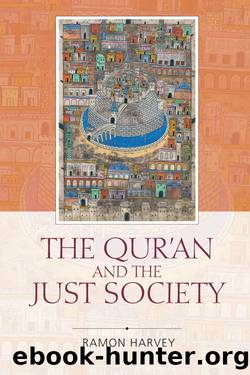The Qur'an and the Just Society by Harvey Ramon;

Author:Harvey, Ramon;
Language: eng
Format: epub
Publisher: Edinburgh University Press
II. Marital strife
Marriage, an institution that brings the lives of two human beings into intimate association, is a microcosm of society at large. Filled with its own triumphs, celebrations, disasters, and wars, there is a need for just procedures to regulate the strife that, if not inevitable, is often to some extent unavoidable. The Qur’an’s focus on piety and good conduct is itself a wellspring of counsel for dissatisfied spouses. However, the scripture provides specific injunctions for those who go beyond the usual travails of married life and become characterised by what it terms nushūz (enmity).50
The term appears twice in the Qur’an, in Q. 4:34 and 4:128, applied to a recalcitrant wife and husband, respectively. The latter verse is couched in general language and can be rendered as, ‘If a wife fears enmity or alienation from her husband, neither of them will be blamed if they come to a peaceful settlement, for peace is best’ (Q. 4:128). The exegetical literature usually reads this as referring to a problem generated by polygyny, in which a wife experiencing enmity and neglect from her husband on account of his recent additional marriage, may suggest giving up part of her dower, support, or share of his time, in order to avoid a looming divorce.51 In this regard it is related by exegetes to Q. 2:229, which regulates khulʿa (compensatory divorce).52
One of the traditional approaches to analysing a verse such as Q. 4:128 is to connect it to a particular sabab al-nuzūl and effectively specify its range of meanings according to that situation. This is commonplace despite the theoretical position that the specific sabab should not specify the general expression.53 The method applied in this book attempts to frame the verse within a socio-historical context that, where possible, is broader than individual anecdotes, as well as using the concept of scriptural niẓām.
As will be discussed in the next chapter, Q. 4:128 may be read as one part of a passage between Q. 4:127 and 4:130 connected with Q. 4:3, dealing with the widowing and orphaning in Medina caused by the Battle of Uḥud in 3/625.54 Such an observation predicates an understanding of the verse’s ḥikma upon the subtle interplay of text and context.
The meaning of Q. 4:128 for the life of the early community, therefore, relates to the challenge that the remarriage of widows due to Uḥud posed to the existing marriages in Medina. The Qur’anic discourse is concerned, first, with keeping marriages intact and harmonious. The arrival of a new wife doubtless brings stresses to an existing marriage that can only be resolved through compromise. The very generality of the language of ṣulḥ (peaceful settlement) used within the verse leaves the details to be worked out according to the particular needs of the situation. This means that there are a wide range of potential solutions, from the husband’s withdrawal of some degree of spousal support, to the first wife’s request for extra money or time – a possibility envisaged by early exegetes.55
Equally, the verse is relevant to the problems that may emerge within a single marriage.
Download
This site does not store any files on its server. We only index and link to content provided by other sites. Please contact the content providers to delete copyright contents if any and email us, we'll remove relevant links or contents immediately.
| Hadith | History |
| Law | Mecca |
| Muhammed | Quran |
| Rituals & Practice | Shi'ism |
| Sufism | Sunnism |
| Theology | Women in Islam |
The History of Jihad: From Muhammad to ISIS by Spencer Robert(2507)
Nine Parts of Desire by Geraldine Brooks(2283)
The Turkish Psychedelic Explosion by Daniel Spicer(2247)
The First Muslim The Story of Muhammad by Lesley Hazleton(2159)
The Essential Rumi by Coleman Barks(1931)
1453 by Roger Crowley(1881)
The Last Mughal by William Dalrymple(1793)
Trickster Travels: A Sixteenth-Century Muslim Between Worlds by Davis Natalie Zemon(1783)
Muhammad: His Life Based on the Earliest Sources by Martin Lings(1569)
by Christianity & Islam(1564)
God by Aslan Reza(1562)
A Concise History of Sunnis and Shi'is by John McHugo(1511)
Magic and Divination in Early Islam by Emilie Savage-Smith;(1457)
No God But God by Reza Aslan(1436)
The Flight of the Intellectuals by Berman Paul(1397)
Art of Betrayal by Gordon Corera(1366)
Nothing to Envy by Barbara Demick(1328)
What the Qur'an Meant by Garry Wills(1322)
Getting Jesus Right: How Muslims Get Jesus and Islam Wrong by James A Beverley & Craig A Evans(1276)
